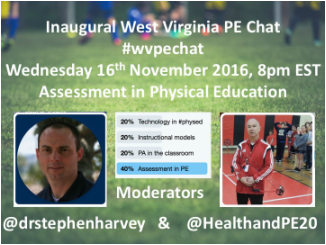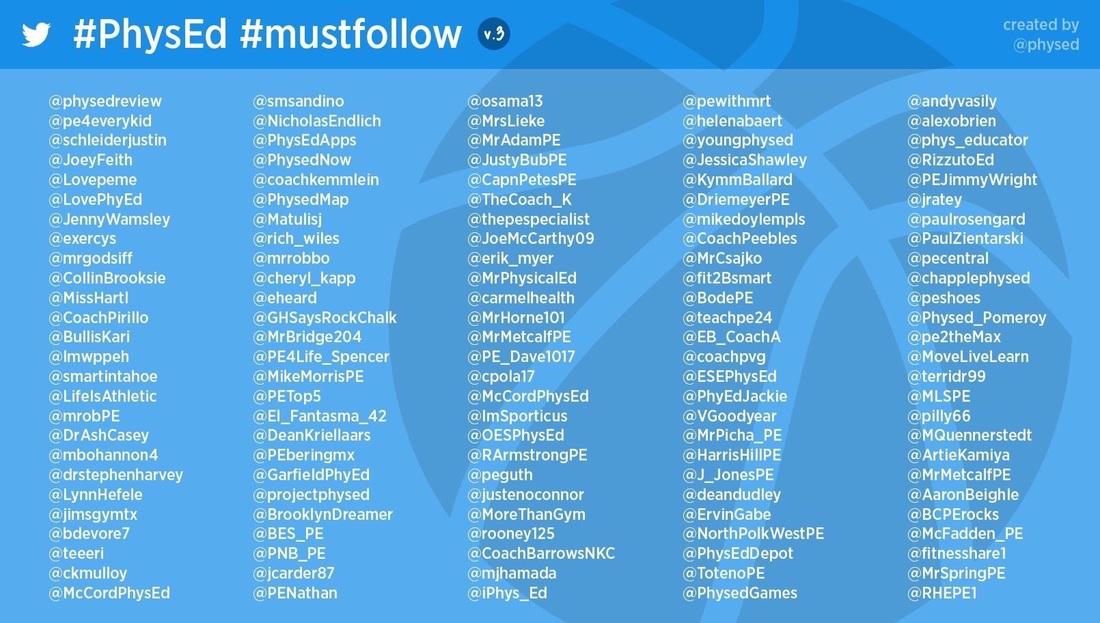|
Here are the links to the various resources from the two sessions delivered at the 2017 SHAPE America Conference.
Session 1: An introduction to netball through Teaching Games for Understanding (Tuesday March 14 2017 - 1.00-3.00pm) a) PowerPoint: docs.google.com/presentation/d/16ZZVUnjk9GOppsjbbfPndJqSC1i64A-NZl_2_RwUd2E/edit?usp=sharing b) Netball Resource Document: drive.google.com/file/d/0B0p0sga6XzeeUXJWallrZ0ZzVkE/view Session 2: Perspectives of Teachers' Change to a Game-Centered Approach (Thursday March 16 2017 - 1.45-3.45pm) a) PowerPoint: http://tinyurl.com/SHAPEBostonGCA b) Resource Document: https://drive.google.com/file/d/0B7xnNH-lvCEPUWQzYXNCMmVxT00/view?usp=sharing Note that if you want to join our TGfU Voxer group, download the app and create an account, and then go to the link below: web.voxer.com/chats/1428635164228_0405589145_9aea6122 Additional information on Voxer PE and Voxer PE groups can be found at the link below: voxerpe.com/
0 Comments
The following information is from the two presentations myself and Phil Edwards did at the USA Field Hockey Coaches Forum in December, 2016. Here are some free access articles that might be useful.
Link to Prezi: https://prezi.com/u3prcpns2n3i/from-practice-to-performance-a-games-based-approach/ Dilemmas faced when using Teaching Games for Understanding: http://ccd.ucam.edu/index.php/revista/article/view/762/371 Free access to paper on questioning: http://www.tandfonline.com/doi/full/10.1080/18377122.2015.1051268 Dilemmas faced when using questioning: https://www.researchgate.net/publication/301650308_Constructivist_dilemmas_associated_with_using_questioning_in_game-based_approaches_to_teaching_and_coaching Join us on Twitter on Wednesday 16th November 2016, 8pm ESTMyself (@drstephenharvey) and Rick Thomas (@HealthandPE20) would like to announce the start of a monthly West Virginia Physical Education Twitter Chat, or what we want it to be known as, #wvpechat. Twitter is a microblogging service that was established in 2006. While it began as a site for people to send and receive brief messages of 'what they were up to...' in no more than 140 characters, which are public on the internet. Messages, known as 'tweets' can also include weblinks, pictures, GIFs and videos, and members can also 'tag' other members Twitter 'handles' in tweets and as part of pictures, GIFs and videos. Twitter members follow each other, gaining updates on what this person is 'up to'. Another feature of Twitter is the ability for members to include 'hashtags' on messages, such as '#wvpechat', ensuring that these members can keep abreast of 'news' related to these specific hashtags. Since Twitters inception, educators have began to create a number of specialized hashtags, and use these hashtags to host chats centered around these hashtags. These 'Twitter Chats' are synchronous in the sense that tweets appear at the same time or concurrently allowing participants in these chat to follow a specific line of focused discussion on a topic. Usually, these Twitter Chats are moderated by educators for educators. The use of a moderator (or more than one moderator) allows the discussion to stay on track around a set of questions on a specific topic area. A brief YouTube video describing how a Twitter Chat works can be seen at the end of this post. Myself and @HealthandPE20 recently hosted two presentations on using social media for continuing professional development and learning (CPDL) at the West Virginia Health, Physical Education, Recreation and Dance Conference in Glade Springs on October 20th. At these presentations we overviewed some of the benefits of using Twitter for CPDL and held a pilot Twitter Chat using the #wvpechat hashtag. At the conclusion of the presentation, we challenged the participants to 'do something' related to our presentation in the 30 days after the presentation. @HealthandPE20 and me also took that challenge to establish a regular monthly #wvpechat beginning in November 2016. After the conference presentation, I posted a vote on Twitter using the #wvpechat hashtag and the majority of votes requested we focus on 'Assessment in Physical Education' (see picture at the end of this post). Consequently, me and @HealthandPE would be grateful if we could gain a decent showing at the Inaugural #wvpechat on the 16th November 2016, 8pm EST. I will prepare a list of questions we will discuss on the evening on this blog, and via the #wvpechat hashtag before the event. If you have any questions, contact me (@drstephenharvey) or @HealthandPE20 with your questions. Before the #wvpechat remember to:
We look forward to having you participate at the Inaugural #wvpechat Twitter Chat to help us inspire everyone in West Virginia to live a healthy and physically active lifestyle!!! Questions for #wvpechat on 16th November 2016 - Assessment in Physical Education Q1: What is the importance of assessment in #physed? Q2: How do you currently assess ur students in #physed? Q3: Who usually conducts ur assessments in #physed? Q4: To what extent are ur assessments ‘authentic’? Q5: What e.g.’s of ‘authentic assessment’ do u currently use that u can you share w’others? The research on game-centered or 'Tactical' approaches to teaching in Physical Education (PE) only exists in isolated instances. One potential reason for the lack of utilization of game-centered or 'Tactical' approaches may be the perceived lack of pertinent assessment tools available to teachers when teaching using these approaches.
To help us gain content and face validity for game performance assessment rubrics for utilization by physical educators when teaching using a Game-Centered Approach (i.e., Teaching Games for Understanding, Tactical Games Model, etc.) we are recruiting physical education teachers and university professors from around the world to complete an online survey to assist with the validation of assessment rubrics in the following activity areas: a) basketball, b) soccer, c) frisbee, d) floor hockey, and, e) volleyball. This project is being conducted by Dr. Stephen Harvey, PhD, an Associate Professor in the College of Physical Activity and Sport Sciences at WVU. Each survey will involve completing responses to up to nine (9) drag and drop content validity questions, three (3) short answer face validity questions, and eleven (11) demographic questions on an online survey platform called Qualtrics. The various surveys for each activity area are hosted at the following web link, and will each take 10-15 minutes to complete: Basketball: http://wvu.qualtrics.com/SE/?SID=SV_0rJ5YWatVatXlYN Soccer: http://wvu.qualtrics.com/SE/?SID=SV_1yTr4GjhqmSHsnX Frisbee: http://wvu.qualtrics.com/SE/?SID=SV_78LnL3cugByFxZ3 Floor Hockey: http://wvu.qualtrics.com/SE/?SID=SV_1If7W59YXo2Wz3L Volleyball: http://wvu.qualtrics.com/SE/?SID=SV_2nlTlmxI3AlmTMF Your involvement in this project will be kept as confidential as legally possible. All data will be reported in the aggregate. You must be 18 years of age or older to participate and be either a university professor, a current licensed physical education teacher or a pre-service teacher enrolled in a teacher education program. Your participation is completely voluntary. If you are a student at West Virginia University completing this form, your decision to participate will not affect your grade, nor will you receive any extra credit for participation in this study. However, all participants will be emailed a final copy of the validated assessment rubric. Note that you may skip any question that you do not wish to answer and you may discontinue at any time. West Virginia University's Institutional Review Board acknowledgment of this project is on file. I hope that you will participate in this survey, as it could be beneficial in developing a range of game performance assessment rubrics for utilization by physical education teacher’s when they use are using game-centered or 'Tactical' approaches in their practice. Should you have any questions about this survey or the associated research project, please feel free to contact Stephen Harvey at +1 (304) 293-0849 or by e-mail at [email protected]. Thank you. Dr. Stephen Harvey.
An overview of the presentation given to USA field hockey level 1 course participants on Sunday 24th January 2016.
|


 RSS Feed
RSS Feed
